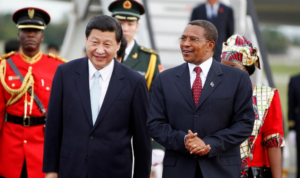|
Getting your Trinity Audio player ready...
|
China’s influence on African economies has become a subject of increasing interest and debate in recent years. As China emerges as a global economic powerhouse, its engagement with African countries has deepened, leading to a range of impacts on the continent’s economic landscape. This article examines the multifaceted influence of China on African economies, covering areas such as trade, investment, infrastructure development, industrialization, social dynamics, and potential challenges.

The Growing Trade Relations
China’s trade relations with Africa have seen exponential growth over the past few decades. As one of Africa’s largest trading partners, China has become a major importer of African raw materials, particularly minerals, oil, and agricultural products. This trade relationship has provided African countries with access to a vast market, boosting their export revenues and economic growth. However, it has also raised concerns about Africa’s overdependence on exporting primary commodities, leaving economies vulnerable to fluctuations in global commodity prices.
Foreign Direct Investment (FDI) Inflows
China’s increasing FDI inflows to Africa have had both positive and negative impacts. On the positive side, Chinese investments have contributed to infrastructure development, such as roads, railways, ports, and energy projects, filling crucial gaps in Africa’s infrastructure deficit. These investments have facilitated connectivity and trade within the continent, enhancing regional economic integration. However, concerns have been raised about the transparency and sustainability of some Chinese investment projects, leading to debates about debt sustainability and potential risks of economic dependency.
Expanding Manufacturing and Industrialization
China’s involvement in Africa has also brought opportunities for industrialization and manufacturing. Some Chinese companies have set up factories and production facilities in African countries, creating employment opportunities and promoting technology transfer. This has the potential to support economic diversification and value addition to African resources. Nevertheless, concerns have been raised about labour standards, environmental impacts, and the potential displacement of local industries.
China’s Role in Infrastructure Development
China’s involvement in building critical infrastructure in Africa has been both transformative and contentious. The construction of roads, bridges, railways, and energy projects has enhanced connectivity and boosted economic development in many regions. However, critics argue that some projects lack transparency and accountability, leading to issues of corruption, environmental degradation, and questionable financial viability. Ensuring sustainable and responsible infrastructure development remains a challenge.
Impacts on Local Businesses and Industries
The influx of Chinese goods in African markets has had mixed impacts on local businesses and industries. While cheaper Chinese products have increased consumer choices and affordability for African consumers, they have also led to the erosion of some local industries, unable to compete with low-cost imports. Ensuring a level playing field for African businesses while promoting fair competition remains a challenge.
Employment and Labor Dynamics
China’s investments in various sectors have created employment opportunities for African workers. However, concerns have been raised about labour practices and whether Chinese firms prioritize hiring local workers. Striking a balance between job creation and respecting labour rights is crucial for sustainable and inclusive economic growth.
Addressing Environmental and Social Concerns
China’s expanding role in Africa has raised concerns about environmental degradation and social impacts. Some Chinese investment projects have been associated with environmental degradation and social displacement. Sustainable development and responsible investment practices are essential to address these challenges and ensure that economic activities do not compromise Africa’s natural resources and local communities.
Building Balanced Partnerships
China’s influence on African economies calls for balanced partnerships that prioritize mutual benefits and sustainable development. African countries must negotiate from a position of strength, ensuring that economic engagements align with their development priorities and national interests. Transparent and accountable governance is crucial for managing Chinese investments effectively and maximizing their impact on African economies.
Conclusion
China’s influence on African economies is multifaceted, bringing both opportunities and challenges. The deepening trade relations, foreign direct investments, infrastructure development, industrialization, and social dynamics have contributed to Africa’s economic growth and development. However, addressing potential risks related to debt sustainability, transparency, labour standards, and environmental impacts is crucial. African countries need to adopt balanced and informed strategies to leverage China’s engagement positively while safeguarding their economic sovereignty and promoting sustainable and inclusive economic development. An open dialogue and responsible partnership between China and African nations are essential to ensure mutual benefits and shared prosperity in this evolving relationship.